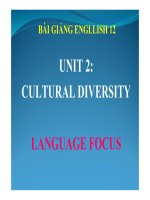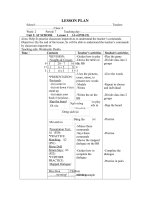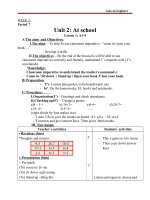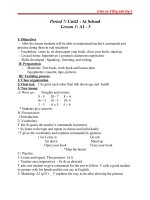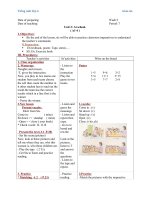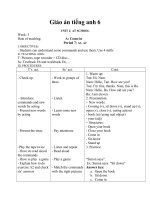Giáo án Tiếng Anh 12 Unit 2: Cultural diversity
Bạn đang xem bản rút gọn của tài liệu. Xem và tải ngay bản đầy đủ của tài liệu tại đây (180.47 KB, 18 trang )
GIÁO ÁN ENGLISH 12
Unit 2: CULTURAL DIVERSITY
A: READING
A. OBJECTIVES:
By the end of the lesson, students will:
- Understand some more about the senses and personal experiences directly related to the
sense.
- Improve their reading skills
B. TEACHING AIDS:
- Textbook, pictures, cassette, tape, handouts and real objects.
C. PROCEDURE:
Method: mainly communicative
Teacher’s activities
Students’ activities
I. Warm up: Network
Competition game – network.
- Group work
- Prepare a hand out with a network of the word’ a
Marriage” and ask Ss the Question
- What things make a marriage happy?
Expected words:
- romantic love
Marriage
- understanding
- sharing
- Divide the class into 8 groups and give each
- partnership of equals
group a hand out.
- Ask Ss to complete the network.
……
- The winner will be the group completing the
network in the shortest period of time.
- Ask students to look at the pictures and work in
pairs to ask and answer the questions.
- What can you see in the pictures?
- What are the differences between them?
- Call students to answer before the class
- Feedback
- Lead to the lesson
II. Before you read:
- Pair works
* Pair works:
- Ask Ss to work in pairs and discuss the question - Answers
+ Which of the following factors is the most
GIÁO ÁN ENGLISH 12
important for a happy life? Why?
- Love a nice house / flat.
- Money, a good job.
- Parents’ approval good health.
- Ask Ss to talk before the class and give the
reason why. The other can asks Questions.
- Free answers
*Vocabulary:
- Give some main words to present using
vocabulary technique to teach.
1. Phycical attractiveness
2. Confiding.
3. Partnership of equals
4. Trust built on love
- Pair work/ group work
5. Diversity (n)
6. Diversify (v)
7. Diverse (adj)
8. Approval (n)
9. Marriage (n)
- Read aloud and ask Ss to repeat
- Correct mistakes
III. While you read:
- Ask Ss to read the text silently to do the tasks.
Focus on the phrases physical attractiveness;
confiding; partnership of equals and trust built on
love….
- Open the tape. T can ask 1 or 2 good student to
read the text aloud.
*Task 1 Explain the meaning of the word/
phrases:
- Ask Ss to read the sentences silently to
understand what to do.
- If Ss have any problems, T might be able to help
them by giving the instruction.
- Give handouts Matching
1.Precede
a. happen or exist before
2. Determine
b. tell some – one about
something
very Private or
secret
3.Confide
c. having a duty to do something.
4. Sacrific
d. find out
5. Obliged
e. willingly stop having something
you
wan
- Go around for help
- Call on Ss to read aloud what they do.
- Read the passage silently
- Individual work/ group work and pair work
Answers
1 – a; 2 – d; 3- b;
4 – e; 5- c
GIÁO ÁN ENGLISH 12
- Give feedback and correct answers.
- Get Ss to read the sentences in task loud what
they do the other can translate them into
Vietnamese pairs by pairs
* Task 2 Answer the following questions:
- Get Ss to read the whole text silently to answers
the question.
- Ask them to work in pairs or groups ask and
answer the questions.
- Call on some Ss to answer in front of the class.
- Give feedback
IV. After you read:
- Divide class into small groups of 6 or 8 and ask
them to discuss the question: What are the
differences between a traditional Vietnamese
family?
* Number of children.
* The house they like to have.
* The head of the family.
* Who works?
* Who takes care of the housework and children?
* The income….
- Go around to help Ss if they have any problem.
- Ask to talk before the class some pairs groups.
V. Homework:
- Pair work/ group work and whole class
- Answers
1. They are Physical attractiveness; Confiding;
Partnership of equals; trust built on love.
2. The young Americans are much concerned
than the young Indians and the Chinese with
physical attractiveness When choosing a wife or
a husband.
3. The Indian students agree that a woman has to
sacrifice more in a marriage than a man.
4. The American wife trusts her husband to do
the right thing because he loves her not because
he has to do.
- Ask Ss to learn the new words by heart, read and 5. The main finding of the survey is that young
translate the text, do the tasks again.
Asians are not as romantic as their American
counterparts
- Prepare the section B (The Speaking part of Unit - Pairs work
two).
* Number of children: more
* The house they like to have : big
* The head of the family: fathers
…..
- Learn the new words by heart, read and
translate the text, do the tasks again.
- Prepare the section B
GIÁO ÁN ENGLISH 12
Unit 2: CULTURAL DIVERSITY
B: SPEAKING
A. OBJECTIVES:
By the end of the lesson, students will:
- Understand more about differences among cultures.
- Discuss information that relates to the differences between Vietnamese and American
cultures
- To improve the students’ speaking skills.
B. TEACHING AIDS:
- Textbook, pictures, cassette, tape, handouts and real objects
C. PROCEDURE:
Method: mainly communicative
Teacher’s activities
I. Warm up:
- Give two tables and ask Ss to work in groups of - Do the task
three or four to complete the table.
Give a picture
- Ask Ss to look at the picture and answer questions
1. What are they doing?
2. Can you guess where they are?
3. In Viet Nam, do people often kiss in public?
Why or Why not?
4. What about in America?
- Lead to the new lesson. Today we will learn about
Students’ activities
GIÁO ÁN ENGLISH 12
the differences between Vietnamese and American
cultures
II. Pre - speaking:
Task 1
- Ask Ss to open the book on page 22
- Ask Ss to read the sentences in the box in Task 1
on page 22.
- Can explain some special expressions if necessary.
- Read aloud and instructs Ss how to use these
expressions.
- Some special expressions
I think / feel / believe…..
I don’t agree……
In my opinion ……
It’s not true……..
For me…..
That’s true / wrong /
….
- Ask Ss to express their point of view on the
following ideas, using the words or expressions in
the box.
● In Vietnam, there are three or even more
generation may live in a nhome.
● A happy marriage should be based on love.
● In some Asian countries, love is supposed to
follow marriage not precede it.
● In some countries, a man and a woman may hold
hands and kiss each other in public.
- T can make a sample conversation with a student
Sample
T: I think a happy marriage should be based on
love.
S: I quite agree with you. Life will be terrible if
there is not true love between a husband and a wife.
T: But in some Asian countries love is supposed to
follow marriage, not precede it.
S: For me, I don’t think it’s true (What will happen
if there is no true love even after marriage). How
can two people who don’t love each other live
happily in the same house?
- Go round the class and helps Ss if necessary.
- Can divide the class into the suitable groups.
III. While-speaking:
Task 2
- Ask Ss to look at task 2 on page 23 and tells them
1.
2.
3.
4.
They are kissing
In the public / In the street
No, they don’t. It’s impolite.
It is very common.
- Ss open the book and look at the sentences in
the box on page 22.
- Ss listen to the teacher and write down the
new expression in their notebooks.
- Ss read after the teacher
- Students choose some of these ideas and then
use the expressions in the box to express their
points of view.
- Ss work in pairs.
GIÁO ÁN ENGLISH 12
to read the typical features of the American culture
in pairs, and then discuss and find out the
corresponding features of the Vietnamese culture.
- Help Ss with the new words and the
pronunciation.
- Give Ss some expressions to help them practice the
conversation easily.
- Some expressions
- Do you know that………?
- It is said that……..
- It is said that in the newspaper / on TV / radio
that.
- Ask Ss to work in pairs to do the task
- Call on some pairs to give their ideas
- Correct and give feedback
- Ss read task 2
- Ss write down some expressions in their
notebooks.
Answers
- Three or sometime four generations live under
one roof
- Elders live with children and are taken care of
by their sons
- Asking about age, marriage and income is
acceptable.
IV. Post speaking:
Task 3: Talk about the similarities and - A Vietnamese greets the head of the family or
differences between Vietnamese and American in an older person first, then the younger ones
cultures
- Groceries are bought everyday
- Explain how to do the task 3
- Tet (Lunar New Year) is the most important
- Ask Ss to read the answer of task 2 again before - Children often sleep with their parents
doing the task 3
Take note
- Ask Ss to work in groups of four.
There are differences and similarities between
- Call on some pairs to give their ideas
Vietnamese and American cultures. In America,
there are two generations live in the same
- Correct and give feedback
house. In Vietnam, two, three or even four
generations live under on roof. It’s tradiotional
for children to live near and take care of their
V. Home work:
parents so old people in Vietnam don’t live in
nursing home as Americans do. Americans
- Ask Ss to work the tasks again
don’t want to be asked about age, marriage
- Ask Ss to write a short passage about the and income while it is acceptable in
differences and similarities in celebrating a wedding Vietnam……
ceremony in Vietnam and American.
GIÁO ÁN ENGLISH 12
- Prepare part C
- Write a short passage about the differences
and similarities in celebrating a wedding
ceremony in Vietnam and American.
- Prepare part C
GIÁO ÁN ENGLISH 12
Unit 2: CULTURAL DIVERSITY
C: LISTENING
A. OBJECTIVES:
By the end of the lesson, students will:
- Listen and understand the conversation about the wedding ceremony in Vietnam.
- Listen and fill the missing information in the gaps.
- Listen and answer the questions about the wedding ceremony in Vietnam.
- Know some more new words about wedding ceremony.
B. TEACHING AIDS:
- Textbook, pictures, cassette, tape, handouts and real objects.
C. PROCEDURE:
Method: mainly communicative
Teacher’s activities
I. Warm-up: Cross words
Students’ activities
• Class work
- Each student with a correct answer will be given a
- Give the cross words on the additional present.
board.
- Read aloud each clue, get students say
aloud the answers.
Suggested answers:
*Cross word:
1
2
1
3
4
5
2
L O V E
3
B R I
4 H U S
6
5
7
*Clues:
1. The woman that a man is married to
2. Every marriages should be based on this
W I
D
F
E
E
B A N D
S
P
R I
N G
6
R I
N
G
7
G
R O O M
GIÁO ÁN ENGLISH 12
3. What do we call a woman on her wedding
day?
- Ss look at the pictures on page 24, work in groups and
then discuss what is happening in each one.
4. The man that a woman is married to
- Ss answer the teacher’s questions
5. People often choose this season to hold 1. I see a wedding ceremony
2. A bride and a groom
wedding ceremonies.
3. They are bringing a lot of gifts
6. To show that you are married, what do
you often wear?
7. What do we call a man on his wedding
day?
- Check and correct.
Answers
1. Yes, I have
2. They usually …………
- Ask Ss to guess the topic of the lesson
today
- Lead to the new lesson
II. Before you listen
- Ask Ss to open the book.
- Ask Ss to look at the pictures on page 24 - Ss write down the new words in the notebook.
and discuss what is happening in each one.
- Give some guide questions:
1. What do you see in the pictures?
2. Who are they?
3. What are they doing?
- Check correct answers
- Ask students to discuss the two questions: - Ss repeat
- Read
1. Have you ever attended a wedding
ceremony?
- Listen
2. What do the bridge and the groom usually - Compare
do at the wedding ceremony?
- Listen and check
- Introduce the new lesson: You will hear
two people talking about a wedding
ceremony in Vietnam. Listen and do some
listening tasks.
* Vocabulary: Listen and Repeat
- Teach some new words first and then play
- Expected answer:
the tape for students to listen and repeat.
GIÁO ÁN ENGLISH 12
Altar: bµn thê
Master of Ceremony:
Banquet:
Groom: chó rĨ
Bride: cô dâu
Ancestor: ông bà tổ tiên
Tray: khay
Schedule: lịch
Blessing: cầu chúc
III. While you listen
1. Task 1
- Explain Task 1 to the Ss.
You will hear two people talking about a
wedding ceremony in Vietnam. Listen to the
tape and fill in the blanks the missing
information.
- Get Ss to read carefully five sentences
before listening the tape to do the task.
1. groom’s parents
2. red paper
3. altar
4. at the wedding banquet
5. wedding cards/ money
- Ss read the questions in Task 2 carefully, listen to the
tape for three times and answer the question
1. The most important thing the groom’s family has to
do on the wedding day is to go to the bride’s house
bringing gifts wrapped in red paper.
2. They would pray, asking their ancestors’ permission
to get married.
- Play the tapes twice
3. After they pray and ask their ancestors’ permission to
- (T can play the tape one more time if get married.
students have difficulty.)
4. The wedding banquet is usually held at the groom’s
- Ask Ss to work individually, then compare and bride’s home or at a hotel or a restaurant.
their answers with the other student.
5. They stop by each table to thank their guests
- Call on some Ss to give their answers,
- Ss read the question carefully and then discuss in
correct and give feedback.
groups
- Answers
2. Task 2: Answering
The wedding is very important to the bride and the
- Ask Ss to read carefully the five questions groom as well as the two families. The wedding day is
carefully chosenm by the groom’s parents because they
first, then let them try to answer before
think that it will affect the future life of the new couple.
listening again to do the task.
Both families have to talk with each other to decide the
place, the number of the guests and how to hold the
- Play the tape twice, one for doing the task,
banquet. Not oly the bride and the groom but nearly all
one for giving feedbacks.
members in the two families have to be sure in their
best clothes on that day. The altars od the both families
- Call on some Ss to give their answers,
are cleaned and well decorated. Then comes the cars
correct and give feedback.
and the flowers. They have to be ordered in advance so
that everything will be available on that day.
IV. After you listen:
Everybody is very busy but they all look forward to that
- Explain the task and ask Ss to work in important day.
groups to discuss the question: What do
families often to do to prepare for a - Write a short paragraph to introduces about the
GIÁO ÁN ENGLISH 12
wedding ceremony?
- Suggestions
- The importantance of wedding
ceremony to Vietnamese people
-
The preparation for the wedding
What groom and bride do on their
wedding day
- Banquet (place, food, drink….)
guests (gifts, blessing, ….)
- Call on some groups to present their
answers
V. Homework:
- Ask Ss to write a short paragraph to
introduces about the wedding ceremonies in
Vietnam.
wedding ceremonies in Vietnam.
- Prepare the new lesson.
GIÁO ÁN ENGLISH 12
Unit 2: CULTURAL DIVERSITY
D: WRITING
A. OBJECTIVES:
By the end of the lesson, students will:
- Write a description about a symbol of the Vietnamese Culture: The Conical Leaf Hat
B. TEACHING AIDS:
- Textbook, pictures, cassette, tape, handouts and real objects
C. PROCEDURE:
Method: mainly communicative
Teacher’s activities
Students’ activities
I. Warm – up:
- Paint some pictures on the board :
- Look at the board
- Look at the pictures and answer:
P1: A line / a slope
P2: A conical form
P1
P2
P3
P4 P3: A triangle
- Ask Ss to look at the pictures and ask: What’s P4: A leaf hat
this?
- Ask Ss some questions
1. Where in Vietnam do people often wear leaf
hat?
Expected answers:
2. Who wear it?
1. Vietnam, Hue city
3. What form is it?
2. Girls, women
- Lead to the new lesson → Describing the 3. Conical form
conical leaf hat.
II. Pre-writing:
- Give Ss some new words:
- Listen and repeat again
+ Leaf (n) : lá cây
+ Rim (n): vành
- Copy
+ Ribs (n) : g©n (lá cây )
+ Strap (n) : d©y(da , lơa , v¶i)
- Read once time and then ask Ss to repeat
again
- Ask Ss to copy it down into their notebooks
1. TASK 1
- Can ask Ss to close the book and answer
- Ss listen to the teacher’s questions and give the
some questions
answers.
1. Have you ever worn a conical leaf hat?
GIÁO ÁN ENGLISH 12
2. Have you ever seen a conical leaf hat?
3. If yes, what does it look like?
- Ss look at the picture on page 25, work in pairs and
finish Task 1
- Now T asks Ss to open the book on page 25,
look at Task 1
- The answer
- Explain Task 1:
1. leaf
You are going to write about the conical leaf
2. ribs
hat or “nãn l¸”, a symbol of Vietnamese
3. rim
culture. Look at the picture below, write
4. strap
Vietnamese equivalents for the English words
- Suggest useful expressions
Useful expression
To be made from: đợc lµm b»ng
- Give some suggested questions
1. What is a symbol of Vietnamese girls and
women?
2. What is considered as a part of the spirit of
Vietnamese nation?
3. What is it made from?
4. What does it look like?
5. What is the diameter?
6. How high is it?
6. How many ribs are shaped into a conical
form?
7. What is it used for?
III. While-writing:
Following questions:
- Ss answer the question
1. The conical leaf hat is a symbol of Vietnamese
girls and women.
2. It is also considered as a part of the spirit of
Vietnamese nation.
3. It’s made from a special kind of bamboo and
young soft palm leaves.
4. It has a conical form.
5. The diameter is about 45 or 50 centimeters and it
is about 25 or 30 centimeters high.
6. Either 16 or 18 ribs are shaped into a conical
form which is then covered with palm leaves. The
leaves are sewn into rims.
Finally the hat is trimmed and painted with a coat of
attar oil.
7. The conical leaf hat is used to protect people from
the sun and the rain.
- Wearing this conical leaf hat in summer sunny days,
girls look more charming.
- The hat also helps to protect their complexion and
give them a cool feeling in such hot weather.
1. Three
2. Introduction – main body – conclusion
3. Materials – shape and size – process
Sample writing :
- The conical leaf hat is one of the typical features of
the Vietnamese culture because it can not be found
anywhere else in the world. The leaf hat is not only a
GIÁO ÁN ENGLISH 12
1. How many parts are there in your
writing?
2. What are they?
3. What do you include in the main body?
- Ask Ss to write a passage of about 150 words
about the conical leaf hat of Vietnam, using the
out line and information below.
- Ask Ss to work individually
- Go around the class to help Ss if necessary
- After that, ask Ss to exchange their writing
symbol of Vietnamese girls and women but not also
become a part of the spirit of the Vietnamese nation.
- The conical leaf hat is made from a special kind of
bamboo and young and soft palm leaves. Either 16 or
18 ribs are shaped into a conical form which is about
45 or 50 centimeters in diameter and about 25 or 30
centimeters high. The conical form is then covered
with palm leaves which are sewn into all ribs. Finally,
the hat is trimmed and painted with a coat of attar oil.
- The conical leaf hat is used like an umbrella to
protect people from the sun and the rain. Beneath the
broad rims of the leaf hat, the girls and women look
more pretty and attractive. Unfortunately they are
now only used by pedestrians or those who ride
bicycles.
- Write task page 19 in the student’s workbook.
- Prepare the new lesson
IV. Post – Writing:
- Feedback to students’ writing
- Collect some of Ss’ works to give feedback
- Should draw Ss’ attentions to the organization
of description and the language use, especially
the verb tenses.
V. HOMEWORK
- Ask Ss to write task page 19 in the student’s
workbook.
GIÁO ÁN ENGLISH 12
Unit 2: CULTURAL DIVERSITY
E: LANGUAGE FOCUS
A. OBJECTIVES:
By the end of the lesson, students will:
- Pronounce correctly the – ed endings sound of verb in the simple past tense.
- Review the usage of tenses.
B. TEACHING AIDS:
- Textbook, pictures, cassette, tape, handouts and real objects
C. PROCEDURE:
Method: mainly communicative
Teacher’s activities
I. Warm up:
Hang a chart with 12 verbs (both regular verb
and irregular verb) with the form: infinitive
without “To”.
Students’ activities
- Look at
For example
see, need, go, laugh, teach , eat, miss, paint,
close, run , play, help
- Divide class into 4 groups.
- Read loudly 12 verbs 2 times.
- Ask Ss to rewrite all verbs which they hear.
- Call leader of each group to go to BB and
write down.
- Check and choose the winner.
- Listen
- Rewrite
- Answer
- Listen
- Ss change these verbs into past simple
- Call some students read all verbs when adding saw, needed, went, laughed, taught, ate, missed,
“ed” at the end of each verb.
painted, closed, ran, played, helped
- Ask Ss to give comment and note how to read
“ed”.
- Lead-in new lesson.
GIÁO ÁN ENGLISH 12
II. Pronunciation:
Activity 1:
- Ss write down the rules in the notebook.
- Give Ss the rules of pronouncing the verbs
ending in -ed
There are three ways
1. ed → /d/ after voiced consonants and vowels.
2. ed → /t/ after [ k , p , s , ∫ , t∫ , f )
3. ed → /id/ after / t, d/
- Ask Ss to look at the verbs on the board and
Suggestion
then write them into the right column
- Read aloud and ask Ss to repeat
- Ask Ss to open the book and look at the words
on page 27.
- Ask Ss to practice
/ t/
/d/
laughed
closed
needed
missed
played
painted
helped
Activity 2:
-Ask Ss to practise reading sentences in - Ss repeat
textbook in pairs and then arrange the verbs into
3 kinds: /t/ - /d/ - /id/.
- Check and give feedback.
- Read
- Play the tape (or read) and ask Ss repeat. (note - Arrange
sentence stress
- work in pairs
III. Grammar: Tense revision
- Ask to look back the examples above and
review the tense
- I have learned English for 7 years.
- I visited my friends.
- Check and give feedback
/ id /
- Remind.
(groupwork)
GIÁO ÁN ENGLISH 12
Exercise1: Use the correct form of the verbs…
- Ask Ss to work individually carefully and
then work in pairs.
- Explains how to use tense if necessary.
Answers:
- Call some Ss to answer and ask class to give
1. Have you seen ; saw ; am going to see
comment.
- Give feedback.
2. drank ; haven’t drunk ; drank
- Call some pairs read the conversation.
3. has written ; Did she write ; wrote
Exercise 2: Multiple choices
4. have been cooking ; cooked ; cooked
- Ask Ss to read exercise carefully.
- Practise the conversation
- Explain the meaning of the difficult words
- Explain how to use tense of necessary.
Answers :
- Ask Ss work in pairs
1. C
5. C
- Call on some Ss answer and ask class to give 2. A
comment.
3. C
6. A
7. C
- Give feedback.
8. A
4. A
Exercise 3: Complete the letter with the
correct form of the verbs in brackets
- Guide students how to do
- Do the first as an example.
- Ask students to to the exercise.
- Call Ss to do on board.
- Correct
IV. Homework:
- Review tenses
- / ? / Give handouts:
Answer:
1. moved
2. moved
3. have asked
4. have not stopped
5. study
6. will fail
7. could talk
GIÁO ÁN ENGLISH 12
EX 1: Choose the best answer:
-> A
1. The wedding party …. at the Rex Hotel.
-> A
A. is
B. is being
C. will be D. are
2. By the end of next year Gorge …..English for
2 years.
A. will have learned
B. will learn
C. has learned
D. would learn
-> B
3. We …. English this time last week.
A. learned
B. were learning
C. have learned
D. had learned
4. The child …. before the doctor arrived.
A. died
B. had died
C. has died
D. was dying
EX 2 : Rewrite this sentences
1. He has been teaching for 20 years. (He
started…)
2. How long have you studied English ? (When)
3. They finished their work, then they drank in
the pub. (After…)
- Prepare Unit 3
-> B
-> He started teaching 20 years ago.
-> When did you start to study English ?
-> After they had finished their work, they drank in
the pub.

